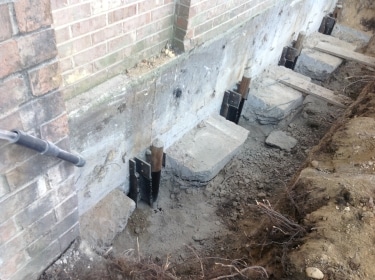
Think about the soil beneath your home. If it’s expansive clay, you’re living on a ticking time bomb. This soil expands when wet and shrinks when dry, causing a constant push-and-pull on your home’s foundation. This might lead to visible cracks in walls, uneven floors, and even misaligned doors. Now, wouldn’t you want to know how to recognize these signs early on or prevent them altogether?
Key Takeaways
- Expansive clay soil swells when wet, exerting pressure on foundation walls, leading to cracks and structural damage.
- The constant cycle of expansion and contraction in clay soil can misalign foundations and create voids causing settlement.
- High moisture retention in clay soil, especially in hot, dry climates, intensifies the structural issues caused by its movement.
- Uneven soil movement results in visible signs of foundation damage such as cracks in walls, sticking doors, and uneven floors.
- Long-term exposure to expansive clay soil conditions can lead to serious foundation issues requiring costly repairs and reinforcement methods.
Understanding Expansive Clay Soil
In the domain of construction and landscaping, expansive clay soil often poses a significant challenge. You see, this unique type of soil has a composition that’s rich in minerals such as smectite clays that have the ability to swell or shrink based on the moisture they’re exposed to.
Understanding the soil composition is essential because it directly affects the soil’s behavior and its potential to damage structures. Unlike sandy soil which drains water quickly, clay soil has high moisture retention capabilities. It can hold onto water for a longer period, which results in the soil expanding substantially when wet.
But here’s the kicker: when the soil dries, it contracts, often leading to ground movement. This constant cycle of expansion and contraction can exert pressure on your foundation, leading to potential damage. It’s like a never-ending tug of war between the soil and your home’s structure.
In essence, expansive clay soil isn’t your typical garden variety dirt. Its unique composition, combined with its ability to retain moisture, can pose serious challenges for construction and landscaping projects.
Always remember, understanding your soil is the first step in preventing potential foundation damage.
How Soil Expansion Occurs
When it comes to expansive clay soil, you might wonder how exactly this expansion process occurs. It’s all about the soil moisture and clay composition.
As clay soil gets wet, it absorbs the water and swells. This is due to the unique composition of the clay, which contains particles that are negatively charged. These particles attract positively charged water molecules, causing the soil to swell as it absorbs the moisture.
Conversely, when the soil dries out, it shrinks. This cycle of expansion and contraction can create pressure on any structures, like a house’s foundation, that are built on the clay soil.
Just to give you a clearer picture, here’s a table that shows the relationship between soil moisture, clay composition, and expansion:
| Soil Moisture Level | Clay Composition | Level of Expansion |
|---|---|---|
| High | High | High |
| High | Low | Medium |
| Low | High | Medium |
| Low | Low | Low |
| Medium | Medium | Medium |
The Impact on Home Foundations
You mightn’t realize it, but the constant expansion and contraction of the clay soil beneath your home can have serious implications for your foundation. This movement, mainly driven by changes in soil moisture, can lead to significant problems that threaten your foundation’s stability.
Imagine the following scenarios:
- Waking up one morning to find cracks in your walls or ceilings, as the shifting soil puts pressure on your home’s structure.
- Walking across a floor that’s become uneven due to the soil’s expansion and contraction beneath your foundation.
- Watching helplessly as your doors and windows become harder to open and close, the result of your home shifting subtly from its original position.
- Noticing damp spots or water leaks in your basement, a sign that the ground is shifting and damaging your foundation’s water barrier.
These aren’t just hypotheticals; they’re real consequences that homeowners like you face when expansive clay soil wreaks havoc on a foundation.
It’s a clear reminder that maintaining ideal soil moisture and ensuring foundation stability aren’t just optional – they’re essential to the health and longevity of your home.
Recognizing Foundation Damage Signs
Spotting the signs of foundation damage early on can save you a whole lot of trouble down the line. The first telltale sign you need to look for involves cracks diagnosis. If you notice cracks in your walls, floors or in the concrete of the foundation itself, it’s a clear indication of potential damage. The formation and growth of these cracks are often due to clay soil expansion beneath your home.
But it’s not just about cracks. You have to take into account the moisture level of your foundation too. The moisture assessment of your foundation is essential because clay soil can absorb a significant amount of water. When it gets wet, it expands, and when it dries, it shrinks. This constant change can lead to foundation problems.
Don’t forget to check your doors and windows too. If they’re sticking or not closing properly, it could be due to a shifting foundation.
In the same vein, any uneven or sloping floors are a surefire sign of trouble. Remember, the earlier you identify these signs, the better chance you have of minimizing the impact on your foundation.
Measures to Prevent Soil Expansion
Having understood the signs of potential foundation damage, let’s now focus on taking proactive steps to prevent soil expansion. Your home’s foundation is vital, and you’ve got to protect it. It’s not only about saving money, but it’s also about keeping your family safe.
First and foremost, you need to maintain a consistent soil moisture around your home. This might sound challenging, but it’s not. Here are a few measures you can take:
- Invest in a good watering system: This helps maintain consistent soil moisture levels. It’s not just for your lawn, it’s for your home’s foundation too. You’re not just watering plants, you’re protecting your home.
- Consider drainage solutions: These are designed to direct water away from your home, preventing soil expansion.
- Plant wisely: Some plants absorb lots of water, which can help maintain soil moisture. But, plant them too close to the house and their roots can damage your foundation.
- Regularly inspect your home: Look for signs of soil expansion and take immediate action. It’s cheaper to prevent damage than to fix it.
Repairing Damaged Foundations
Despite your best efforts, there may come a time when foundation damage is inevitable. This damage, often caused by expansive clay soil, can affect various foundation types. However, it’s not the end of the world. With the right repair techniques, you can restore your foundation’s integrity.
The first step is to identify the foundation you’re dealing with. Whether it’s a slab, crawl space, or full basement, each type has unique repair needs. For instance, slab foundations often require underpinning or piers to correct soil-related issues.
Crawl spaces might need encapsulation or jacks to support weakened areas. Basements, on the other hand, could benefit from interior waterproofing or wall anchors to counteract pressure from expansive soil.
Once you’ve identified your foundation type, you’ll need to choose a repair technique suitable for its specific damage. This could range from simple crack filling for minor issues to more complex methods like mudjacking or piering for severe settlement problems.
Always consult with a professional to guarantee the chosen method will effectively address the damage. Remember, a well-repaired foundation not only guarantees your home’s safety but also preserves its value.
Long-Term Maintenance Strategies
After repairing your foundation, it’s crucial to adopt long-term maintenance strategies to prevent future damage.
The expansive clay soil surrounding your home can be a silent destroyer, causing structural issues over time. However, with proactive measures, you can safeguard your foundation.
Adopt these measures to protect your home:
- Implement drainage solutions: Proper drainage prevents water from pooling around your foundation, which can cause the clay soil to expand.
- Practice appropriate landscaping techniques: Plant trees and shrubs at a safe distance from your home to prevent roots from disturbing the soil around your foundation.
- Regular inspections: Have a professional conduct regular inspections to catch early signs of damage.
- Keep the soil moisture consistent: Too dry or too wet can both be harmful. Aim for a consistent moisture level to prevent soil expansion and contraction.
Frequently Asked Questions
What Is the Cost of Repairing Foundations Damaged by Expansive Clay Soil?
You’re probably wondering about the cost of fixing foundations damaged by expansive clay soil.
It’s not cheap, I’ll tell you that. Depending on the severity, you might spend between $1,800 to $7,000. This includes repair techniques like piering and slabjacking.
If soil stabilization is needed, that’s an additional cost. Remember, it’s essential to get a professional assessment. They’ll provide a more accurate quote based on your unique situation.
Can Certain Types of Plants or Trees Exacerbate Soil Expansion Problems?
Yes, certain types of plants and trees can make soil expansion problems worse.
When you plant trees or plants with deep, invasive roots near your home, they can exacerbate issues. These plant roots absorb moisture from the soil, causing it to contract.
Conversely, when the roots die or the plant is removed, the soil can expand as it refills with water. This fluctuation can lead to foundation damage.
Is It Safe to Live in a House While Foundation Repairs Are Being Done?
Yes, it’s generally safe to live in your house while foundation repairs are happening.
Contractors take precautions to guarantee foundation repair safety, minimizing risk. There’s usually no need to alter your living arrangements, but you’ll experience some noise and disruption.
However, always follow your contractor’s advice. If they suggest temporary relocation due to extensive repairs, it’s best to heed their advice for your safety and comfort.
Does Homeowners Insurance Typically Cover Foundation Damages Caused by Expansive Clay Soil?
Typically, your homeowner’s insurance doesn’t cover damages to your foundation caused by expansive clay soil.
Insurance policies often exclude “earth movement,” which includes soil expansion. It’s crucial to understand your coverage limits and exclusions.
If you’re worried about potential damages, you might want to think about additional coverage options. Always consult your insurance provider for more precise information pertaining to your specific coverage.
Are There Specific Regions or Climates More Prone to Problems With Expansive Clay Soil?
Yes, certain regions are more susceptible to issues with expansive clay soil.
Typically, you’ll find this soil composition in areas with distinct wet and dry seasons, like the Southern and Midwestern U.S.
The soil expands when wet and contracts when dry, causing movement beneath foundations.
It’s essential to know your area’s soil type before building to prevent possible damage from expansive clay.
Conclusion
So, you’ve learned how expansive clay soil can seriously mess up your home’s foundation. It’s not just about cracks and unevenness, it’s about the safety and integrity of your home. Don’t fret, though. There are steps you can take to prevent soil expansion and fix any existing damage. Remember, regular maintenance is key to keeping your foundation strong and secure. Don’t underestimate the power of prevention, it could save your home.

Seal-tite Basement Waterproofing Co. is a full service basement environment contractor. We carry an A+ Better Business Bureau rating. We repaired over 40,000 homes and structures in Virginia, West Virginia, Tennessee, and North Carolina. We are fully insured and licensed. We have worked in all types of locations, including residential and commercial locations, government agencies, colleges, hospitals, churches, and condo associations.
Seal-tite® offers a lifetime transferable warranty. We carry a Class A Contractor’s License and we are fully insured. Our satisfied customers range from government agencies to businesses, hospitals, colleges, churches, and thousands of homeowners. Your home is probably the single largest investment you will make in your lifetime. Don’t wait, call Seal-tite® to help make your home dry, safe and livable.

